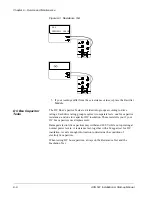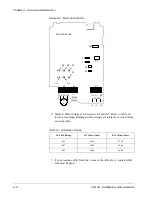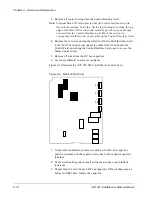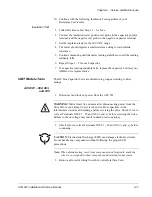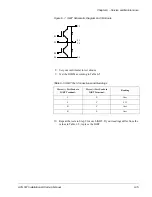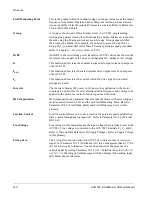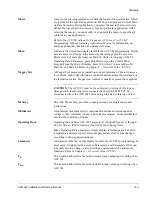
ACS 501 Installation & Start-up Manual
G-1
Glossary
Analog Input (AI)
An Analog Input is an input to the ACS 501 for a user-supplied DC signal.
The signal may be a speed reference or a process feedback. This signal can be
from:
•
Manual speed pot
•
DC voltage (0 to 10 VDC)
•
DC current (0 to 20 mADC)
Analog inputs on the ACS 501 Keypad Display are abbreviated AI.
Converter
The ACS 501 series adjustable frequency drive (AFD) uses a three-phase
diode bridge to convert the applied AC line voltage to rectified DC.
DC Bus
The DC Bus is comprised of the:
•
DC potential source (internal rectifier bridge or external source),
•
DC link inductor (connecting the DC bus capacitors to the DC potential
source), and
•
DC bus capacitors that, together with the DC link inductor, provide
filtration of the DC source potential and provide some buffering between
the DC source and the power inverter section.
The DC Bus voltage is 1.35 x Supply Voltage (V
IN
).
Default
A default is a pre-programmed value for a parameter. When you first install
and start your ACS 501 drive, all application macro parameter values
appearing on the Keypad Display are default settings. You may change these
default settings in the process of customizing your drive for your particular
drive application.
Digital Input (DI)
The Digital Inputs (DI) receive bistable (two-state On-Off) control signals
from the outside world. An example of such would be a two-position Start-
Stop selector switch. Digital inputs on the ACS 501 Keypad Display are
abbreviated DI.
EEPROM
EEPROM is an acronym for Electrically Erasable Programmable Read Only
Memory. The EEPROM is the non-volatile memory that stores all parameters,
even when power is removed.
ESD
ESD is an acronym for Electrostatic Discharge. ESD cautions indicate
situations in which static electricity can damage circuit boards on the ACS
501 drive. Follow the precautions listed in the Safety section at the beginning
of this manual when installing or removing circuit boards.


